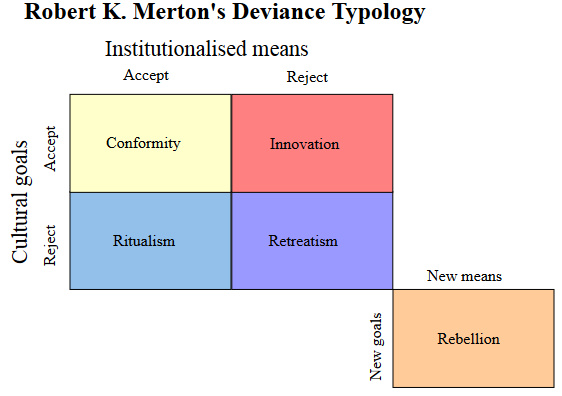Blog #2: Bong Joon-Ho's Parasite (2019): Why people resort to deviant behavior
Parasite (2019). Dir. Bong Joon-Ho
Most people want to move up in society to achieve financial success and material wealth, and live an affluent life. But the means and opportunities to achieve social mobilization are often unavailable to lower-class communities. This lack of opportunity is most felt in poor communities, where the primary goal is to escape poverty. Poor people are caught in a poverty trap, that is, "a mechanism that makes it very difficult for people to escape poverty" (Chen, 2022). Chen points out that poverty traps exist in economic systems that require significant capital to escape poverty. When people lack the capital and the opportunity to acquire capital via the prescribed means, they turn to illegitimate (and mostly deviant) means (Mehlum et al., 2005). We see this in the Korean film Parasite (2019), which centers around the Kim family trying to escape from the 'basement' of society.
Parasite (2019): Escaping the basement
Parasite, directed by Bong Joon-Ho (who majored in Sociology at Yonsei University), is a masterclass in depicting the real-life struggles of poor families in contemporary South Korea and providing a commentary on the capitalist ideology that dominated the Western world (Kim, 2020). It tells the story of the Kim family, who resides in a semi-basement, trying to make ends meet by doing various jobs such as folding pizza boxes. When a family friend convinces the eldest son Ki-woo to replace him as the English tutor for the affluent Park family, he together with his family devises an elaborate plan to scam and conspire against the Park family in hopes to move up from the bottom of society. The Kims succeeded at first to earn huge sums of money, however, when their plan was discovered, later on, they turn to commit blackmail, assault, and even murder.
Anomie Theory: Robert Merton's Strain Theory and the Kim Family
The story of the Kims is consistent with the anomie theory, which posits that individuals turn to deviant behavior because society pressures them to become deviant in order to adapt to the social strains that they experience (Clinard & Meier, 2011). Anomie is felt when individuals struggle to achieve culturally valued goals such as aspirations to move up in life through the legitimate means that society allows to achieve those goals. When legitimate means are exhausted, individuals may innovate, that is, they move towards illegitimate means such as crime, to achieve the culturally valued goals of society (Clinard & Meier, 2011). Other individuals may engage in ritualism, where they conform to society's norms and means but do not hope or expect to achieve cultural goals. These individuals work and study just for the sake of working and studying. Meanwhile, other individuals may retreat, totally abandoning the goals and the means to achieve those goals by engaging in substance abuse. People who are frustrated with society's goals and ways to achieve them may altogether create and establish new societal goals and institutional means by rebelling, such as the case with revolutionary groups.
Robert Merton's Strain Theory. Image from: https://images.squarespace-cdn.com/content/v1/57cf17802e69cf96e1c4f406/1473210428684-Q8AIM3HA9NMX8AMJBAD2/Merton-Diagrams-of-Theory-Deviance-Typology-2014-The-Brief-Note.jpg
The Kims, in this case, are innovating. While they accept the cultural goal of affluence and escaping poverty, they are unable to pursue the institutional means to achieve them. Hence, they perform deviant acts.
The film ends with Ki-woo, fantasying about buying the Park family's house. A plan takes shape in his head: he would go to college and get a job to earn so much money to buy the house. But this is only a fantasy, a dream for the basement dwellers that legitimate means of achieving cultural goals is possible. Ki-woo snaps back to reality inside the semi-basement, realizing the impossible task ahead of him.
References:
Chen, J. (2022). Poverty trap. Investopedia. https://www.investopedia.com/terms/p/poverty
Clinard, M.B. and Meier, R.F. (2011). Sociology of Deviant Behavior, 14th ed. Wadsworth, Cengage Learning.
Kim, J. (2020). Parasite: A Film Review on Capitalism. Cinesthesia, 10(2). https://scholarworks.gvsu.edu/cgi/viewcontent.cgi?article=1198&context=cine
Mehlum, H., Moene, K., & Torvik, R. (2005). Crime induced poverty traps. Journal of Development Economics, 77(2), 325–340. https://doi.org/10.1016/j.jdeveco.2004.05.002
Clinard, M.B. and Meier, R.F. (2011). Sociology of Deviant Behavior, 14th ed. Wadsworth, Cengage Learning.
Kim, J. (2020). Parasite: A Film Review on Capitalism. Cinesthesia, 10(2). https://scholarworks.gvsu.edu/cgi/viewcontent.cgi?article=1198&context=cine
Mehlum, H., Moene, K., & Torvik, R. (2005). Crime induced poverty traps. Journal of Development Economics, 77(2), 325–340. https://doi.org/10.1016/j.jdeveco.2004.05.002


Comments
Post a Comment